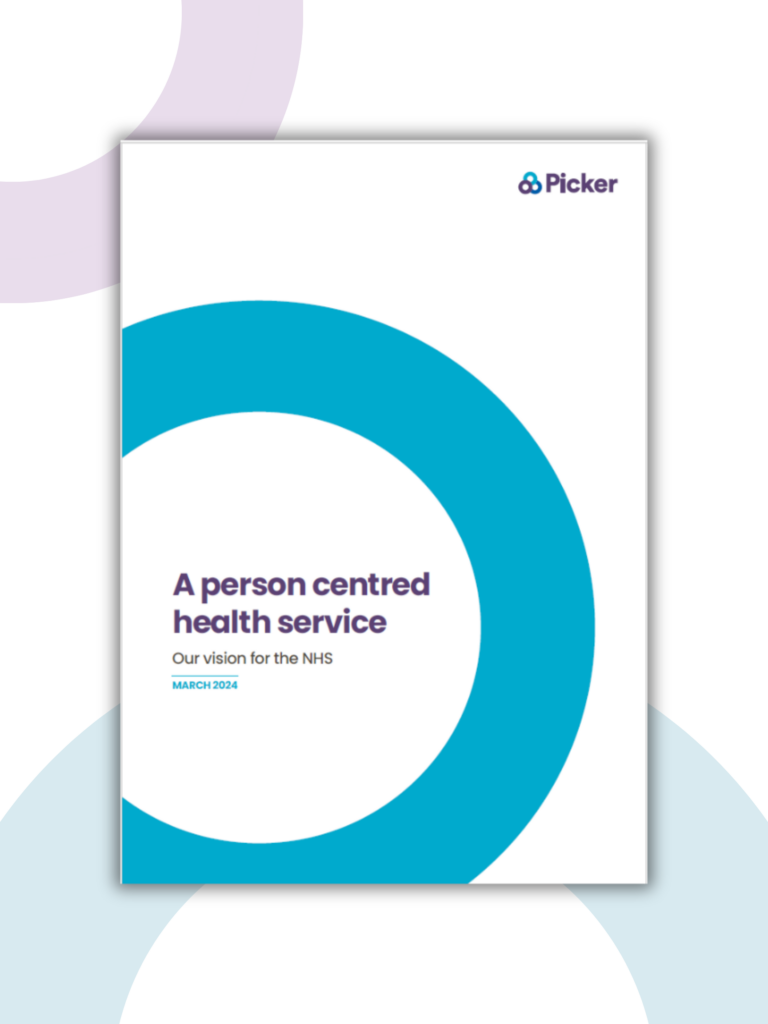The importance of clear communication in children’s cancer services
In this blog, Caroline Hancock, Research Associate at Picker, delves into the significance of open communication within children’s cancer services, emphasising its pivotal role in fostering a positive patient experience.
Navigating the journey of childhood cancer can be difficult, emotional, and challenging for children and their families. One of the many insights we have been able to glean from the Under 16 Cancer Patient Experience Survey is that a foundation of compassionate and clear communication can make all the difference to children and their families. The commitment to effective communication aligns with the fundamental Picker Principles of Person Centred Care, ensuring that children and their families feel heard, understood, and supported.
The Under 16 Cancer Patient Experience Survey
The Under 16 Cancer Patient Experience Survey sheds light on how children, young people and their families experience cancer care. The 2022 survey findings reveal reassuring statistics, with 71% of children expressing that healthcare staff always addressed them directly, recognising their individual agency beyond their parents or caregivers. Additionally, 69% of children consistently understand information shared by healthcare professionals, reflecting positive engagement in communication. However, this means that 31% do not consistently grasp the information, showing that this is still an area for improvement. This emphasises the need to enhance communication strategies to ensure a higher percentage of children comprehend healthcare information effectively.
Empowering children, parents, and carers across the ongoing journey of cancer care
The significance of involving parents, carers, and, most importantly, the children themselves in the communication of their care cannot be overstated. Empowering everyone with the knowledge and confidence to participate actively in this challenging healthcare journey is a key component of holistic and person centred care. This is especially crucial because childhood cancer care is not a brief stint but rather a marathon, spanning multiple stages from diagnosis to post-treatment and subsequent regular check-ups. It is essential that communication is clear and consistent across every stage.
The 2022 Under 16 Cancer Patient Experience Survey results revealed…
- At the point of diagnosis, 69% of children, and their parents or carers, reported that information was provided in a manner they could comprehend. This reinforces the importance of clear communication during what is likely to be an emotionally challenging time, ensuring that families receive vital information without added confusion or distress.
- 90% of children, and their parents or carers, reported that healthcare staff provided details about who to contact for further information after the news of their child’s cancer or tumour. This proactive approach exemplifies the commitment to ongoing support, guiding families towards additional resources and assistance.
- Throughout the treatment journey, 85% of parents or carers reported that they were offered clear information regarding their child’s treatment. This emphasis on clarity not only empowers parents and carers with knowledge but also helps them actively participate in decision-making processes concerning their child’s care.
- Despite the challenges, 68% of children, and their parents or carers, expressed feeling involved in the care and treatment. This involvement is pivotal in fostering a sense of shared responsibility and trust between healthcare providers and families, encouraging a collaborative approach towards the child’s well-being.
- Amidst the medical aspects, empathy and understanding are fundamental. Notably, 83% of parents or carers felt they were always treated with empathy and understanding by the healthcare staff caring for their child. This compassionate approach creates a supportive environment, acknowledging the emotional toll and reinforcing a sense of partnership between healthcare professionals and families.
- Moreover, 75% of parents or carers agreed that staff are always sensitive to the information they share when their child is present. This attunement to the environment ensures that families feel respected and considered, amidst potentially challenging conversations.
Strategies for effective communication
To enhance communication within children’s cancer services, healthcare providers can adopt various strategies. These may include using age-appropriate language, visual aids, and interactive methods to ensure that information is accessible and comprehensible to young patients. Encouraging and addressing questions contributes to fostering a culture of openness and understanding, and in the realm of children’s cancer services, clear communication emerges as a cornerstone of compassionate and person centred care. By prioritising clear communication, healthcare providers can contribute to a nurturing and supportive environment that empowers children and their families to navigate the complexities of childhood cancer with resilience and hope.
Full details about the survey and results are available on the dedicated survey website.
